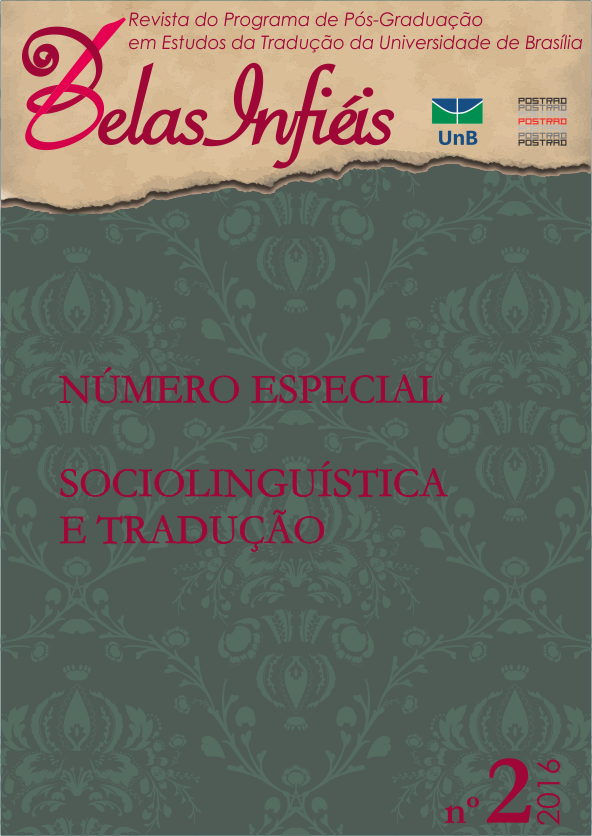MUDANÇAS LINGUÍSTICAS, VARIEDADES APROXIMATIVAS E TRADUÇÃO
DOI :
https://doi.org/10.26512/belasinfieis.v5.n2.2016.11387Mots-clés :
Sociolinguística, Mistura de línguas, Mudança linguística, TraduçãoRésumé
Das demandas midiáticas e comunicativas em um contexto globalizado surge a necessidade do uso de empréstimos linguísticos, tanto para fins de interação como de entretenimento. O uso de variedades aproximativas faz com que as línguas, diacronicamente, sofram modificações tanto na sua organização sintática quanto no léxico e em seu valor semá‚ntico, em especial na produção de neologismos incorporados à língua. Assim, a sociolinguística busca entender como as línguas se alteram, por meio de processos recorrentes e cíclicos de influência mutuas que podem ocorrer diacronicamente e sincronicamente, conforme a produção dos falantes. Com efeito, as diversas incidências causadas por constantes contatos de línguas fazem surgir novas criações linguísticas, que se propagam conforme a necessidade de uso, substituindo por vezes terminologias e expressões anteriores. Resultam em uma influência direta cujo eco é observado em processos gramaticais posteriores, desdobramentos das modificações introduzidas. Os falantes determinam quais mudanças serão consolidadas e, ao longo das gerações, tratam os neologismos como já pertencentes à língua, num fenômeno de ampliação lexical. Ao estabelecer uma conexão entre os estudos sociolinguísticos desenvolvidos por Calvet (2002), Faraco (2004), Labov (2008) e Bortoni-Ricardo (2014) acerca dos pidgins, das línguas crioulas e das possíveis mudanças linguísticas que possam ocorrer dentro de um contexto comunicativo de duas ou mais línguas em contato, analisamos qual a sua importá‚ncia no á‚mbito da tradução, e de que forma as afetam diretamente.
Téléchargements
Références
BORTONI-RICARDO, Stella Maris. Manual de Sociolinguística. São Paulo: Contexto, 2014.
CALVET, Louis-Jean.Sociolinguística: Uma Introdução Crítica. Tradução de Marcos Marcionilo. São Paulo: Parábola Editorial, 2002.
FARACO, Carlos Alberto (org.).Estrangeirismos ”“Guerras em torno da língua.;3. Ed ”“São Paulo: Parábola Editorial, 2004.
LABOV, William. Padrões Sociolinguísticos. Tradução Marcos Bagno, Maria Marta Pereira Scherre, Caroline Rodrigues Cardoso. São Paulo:Parábola Editorial, 2008.
Téléchargements
Publié-e
Comment citer
Numéro
Rubrique
Licence
Copyright Statement
Given the public access to this journal, the texts are free to use but requires the recognition of the original authorship and initial publication in this journal to be properly stated.
The journal allows the use of works published for non-commercial purposes, including the right to submit the work to publicly accessible databases. Published contributions are the sole and exclusive responsibility of the author(s).
- When submitting papers to be evaluated by the Belas Infiéis journal, the author(s):
- Declare that the contents of the contributions are original and of their original creation, being entirely responsible for their content if there is an objection by third parties.
- Claim to be aware that they should not commit academic plagiarism.
- Declare that the manuscript has not been published, completely or partially, in Portuguese or another language. If it is a translation it should be submitted to the Translated Articles section.
- Declare that the manuscript is not being evaluated by other journals.
- Declare that the manuscript was not submitted to another journal simultaneously.
- Commit(s) to inform the journal of any kind of error or inaccuracy in their contribution (published, in evaluation or in editing) and to collaborate with the editors to make due corrections of the article (when in evaluation or editing) or erratum/retraction (after publication).
- Declare that there is no conflict of interest regarding the published work.
- Authorize its release if it is accepted for publication without any kind of monetary compensation.
- Agree to assign non-exclusive rights to publication to the magazine, remaining free to make their contribution available in other media as long as the publication of the first version in Belas Infiéis magazine is mentioned. They also authorize Belas Infiéis to assign their texts for reproduction in content indexers, virtual libraries and similar platforms.
- Maintain copyright and grant the journal the right of first publication, the work being licensed under theCreative Commons Attribution License.
- Is/Are allowed and encouraged to publish and distribute their work online after the editorial process, which may increase the impact and citation of the published work.
- Authorize the editorial team to make textual adjustments and to adapt the article to the publication rules, when necessary.



















